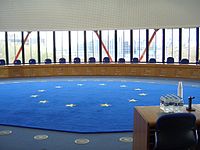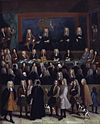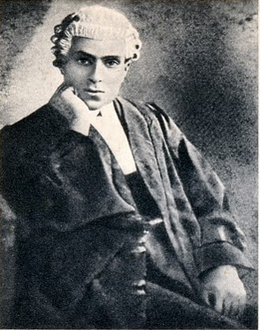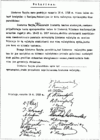
Portal:Law
- Wikipedia portals: Culture
- Geography
- Health
- History
- Mathematics
- Natural sciences
- People
- Philosophy
- Religion
- Society
- Technology
The Law Portal
Law is a system of rules, usually enforced through a set of institutions. It shapes politics, economics and society in numerous ways and serves as a primary social mediator of relations between people. Contract law regulates everything from buying a bus ticket to trading on derivatives markets. Property law defines rights and obligations related to the transfer and title of personal (often referred to as chattel) and real property. Trust law applies to assets held for investment and financial security, while tort law allows claims for compensation if a person's rights or property are harmed. If the harm is criminalised in a statute, criminal law offers means by which the state can prosecute the perpetrator. Constitutional law provides a framework for the creation of law, the protection of human rights and the election of political representatives. Administrative law is used to review the decisions of government agencies, while international law governs affairs between sovereign states in activities ranging from trade to environmental regulation or military action. Writing in 350 BC, the Greek philosopher Aristotle declared, "The rule of law is better than the rule of any individual."
Legal systems elaborate rights and responsibilities in a variety of ways. A general distinction can be made between civil law jurisdictions, which codify their laws, and common law systems, where judge made law is not consolidated. In some countries, religion informs the law. Law provides a rich source of scholarly inquiry, into legal history, philosophy, economic analysis or sociology. Law also raises important and complex issues concerning equality, fairness and justice. "In its majestic equality", said the author Anatole France in 1894, "the law forbids rich and poor alike to sleep under bridges, beg in the streets and steal loaves of bread." In a typical democracy, the central institutions for interpreting and creating law are the three main branches of government, namely an impartial judiciary, a democratic legislature, and an accountable executive. To implement and enforce the law and provide services to the public, a government's bureaucracy, the military and police are vital. While all these organs of the state are creatures created and bound by law, an independent legal profession and a vibrant civil society inform and support their progress. (more...)
Selected article
The Court of Chancery was a court of equity in England and Wales that followed a set of loose rules to avoid the slow pace of change and possible harshness (or "inequity") of the common law. The Chancery had jurisdiction over all matters of equity, including trusts, land law, the administration of the estates of lunatics and the guardianship of infants. Its initial role was somewhat different, however; as an extension of the Lord Chancellor's role as Keeper of the King's Conscience, the Court was an administrative body primarily concerned with conscientious law. Thus the Court of Chancery had a far greater remit than the common law courts, whose decisions it had the jurisdiction to overrule for much of its existence, and was far more flexible. Until the 19th century, the Court of Chancery could apply a far wider range of remedies than the common law courts, such as specific performance and injunctions, and also had some power to grant damages in special circumstances. With the shift of the Exchequer of Pleas towards a common law court, the Chancery was the only equitable body in the English legal system. ( more...)
Selected biography
Ioan Constantin Filitti (May 8, 1879 – September 21, 1945) was a Romanian historian, diplomat and conservative theorist, best remembered for his contribution to social history, legal history, genealogy and heraldry. A member of the Conservative Party and an assistant of its senior leader Titu Maiorescu, he had aristocratic ( boyar) origins and an elitist perspective. Among his diverse contributions, several focus on 19th-century modernization under the Regulamentul Organic regime, during which Romania was ruled upon by the Russian Empire. As a historian, Filitti is noted for his perfectionism, and for constantly revising his own works.
I. C. Filitti had an auspicious debut in diplomacy and politics, but his career was mired in controversy. A " Germanophile" by the start of World War I, he secretly opposed the pact between Romania and the Entente Powers, and opted to stay behind in German-occupied territory. He fell into disgrace for serving the collaborationist Lupu Kostaki as Prefect and head of the National Theatre, although he eventually managed to overturn his death sentence for treason. Filitti became a recluse, focusing on his scholarship and press polemics, but was allowed to serve on the Legislative Council after 1926. ( more...)
Did you know...
- ... that other than the Second World War, there has never been a declaration of war by Canada?
- ... that in Young v. Facebook, Inc., Judge Jeremy Fogel found that Facebook was not a physical place for the purpose of the Americans with Disabilities Act, despite its having "posts" and "walls"?
- ... DYK3
- ... DYK4
- ... DYK5
- ... DYK6
- ... DYK7
- ... DYK8
Selected picture
Selected case
Ashford v Thornton (1818) 106 ER 149 is an English law case in the Court of King's Bench that upheld the right of the defendant, on a private appeal from an acquittal for murder, to trial by battle. In 1817, Abraham Thornton was charged with the murder of Mary Ashford. Thornton had met Ashford at a dance, and had walked with her from the event. The next morning, Ashford was found drowned in a pit, with little outward signs of violence. Although public opinion was heavily against Thornton, the jury quickly acquitted him, and also found him not guilty of rape.
Mary's brother, William Ashford, launched an appeal, and Thornton was rearrested. Thornton claimed the right to trial by battle, a medieval usage that had never been repealed by Parliament. Ashford argued that the evidence against Thornton was overwhelming, and that he was thus ineligible to wage battle.
The court decided that the evidence against Thornton was not overwhelming, and that trial by battle was a permissible option under law; thus Thornton was granted trial by battle. Ashford declined the offer of battle and Thornton was freed from custody. Appeals such as Ashford's were abolished by statute the following year, and with them the right to trial by battle. ( more...)
Selected statute
The Act of Independence of Lithuania was signed by the Council of Lithuania on February 16, 1918, proclaiming the restoration of an independent State of Lithuania, governed by democratic principles, with Vilnius as its capital. The Act was signed by all twenty representatives, chaired by Jonas Basanavičius.
After the Germans, who were in control of Lithuania, lost World War I in the fall of 1918, the first Cabinet of Lithuania was formed, and the Council of Lithuania gained control over the territory of Lithuania using the Act. Independent Lithuania, although it would soon be battling the Wars of Independence, became a reality.
The laconic Act is the legal basis for the existence of modern Lithuania, both during the interwar period and since 1990. The Act formulated the basic constitutional principles that were and still are followed by all Constitutions of Lithuania. The Act itself was a key element in the foundation of Lithuania's re-establishment of independence in 1990, being used as evidence that Lithuania was simply re-establishing the independent state that existed between the world wars. ( more...)
- March 21: Anonymous people reveal animal cruelty at Australian Inghams poultry producer factory using CCTV footage
- March 18: Swiss woman gang-raped in Madhya Pradesh, India
- March 5: Chadian army: Mokhtar Belmokhtar 'killed' in Mali
- March 3: Al-Qaeda commander Abou Zeid killed in Mali by French forces
- February 26: Wikinews interviews Irene Villa
- February 25: Scottish police arrest two over Glasgow apartment death
- February 18: Police charge man over fatal hit and run in Birmingham, UK
- February 18: East London double shooting kills teenager, seriously injures man
- February 18: Northern Ireland police arrest man over Belfast double shooting
- February 15: Teenager arrested over Dingwall, Scotland hostel fire
Quality content
- Featured articles
|
|
|
- Featured lists
|
|
|
- Good articles
For a list of good articles on legal topics, see here.
Categories
Wikiprojects
- WikiProject Law
- WikiProject International law
- WikiProject Australian law
- WikiProject Canon Law
- WikiProject Canadian law
- WikiProject U.S. Supreme Court cases
- WikiProject Law Enforcement
- WikiProject FBI
- Wikiproject Correction and Detention Facilities
- WikiProject Taxation
- WikiProject Crime and Criminal Biography
- WikiProject Human rights
Things you can do
Related portals
 |
|
 |
 |
 |
 |
 |
| Philosophy | Politics | Society | Law of England and Wales |
Supreme Court of the United States |
Criminal justice | Human rights |
- What are portals?
- List of portals
- Featured portals






